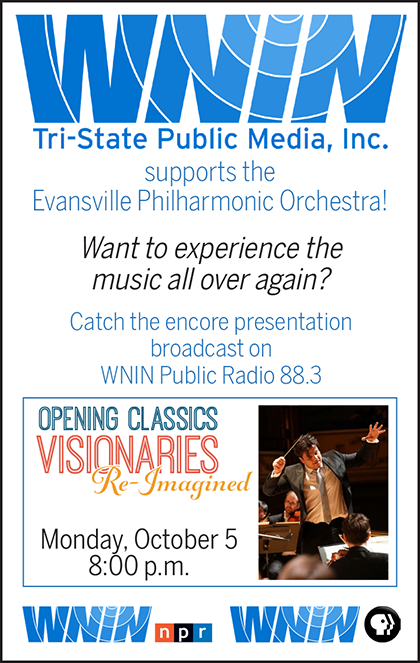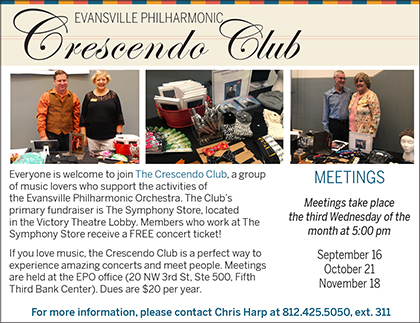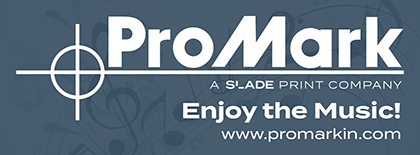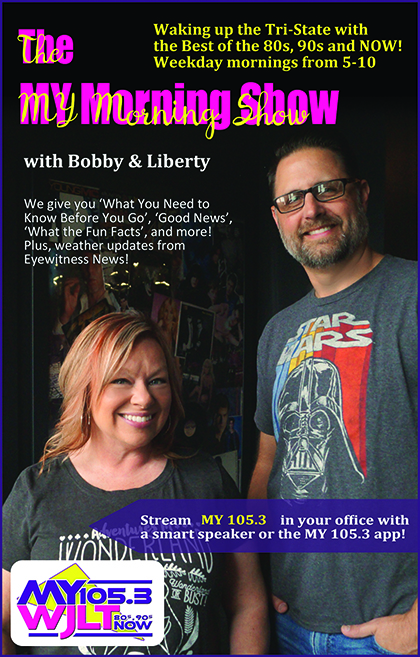
PROGRAM
SUNDAY, SEPTEMBER 20, 2020 AT 2:00 P.M.
SUNDAY, SEPTEMBER 20, 2020 AT 7:30 P.M.
VICTORY THEATRE
PAUL DOOLEY River City
WORLD PREMIERE
Commissioned Fanfare for the Evansville Philharmonic Orchestra and the City of Evansville
J.S. BACH Keyboard Concerto in A major, BWV 1055
Allegro
Larghetto
Allegro ma non tanto
GEORGE WALKER Lyric for Strings
W.A. MOZART Divertimento for Strings in D major, K. 136
Allegro
Andante
Presto
Official IT Services Provider:

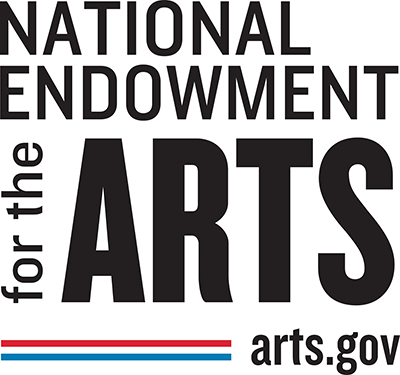

This project is made possible by the Indiana Arts Commission, the Arts Council of Southwestern Indiana, and the National Endowment for the Arts, a federal agency.
Steinway is the official piano of the Evansville Philharmonic Orchestra.
Special thanks to the Evansville Horn Choir (Emily Britton, Director) for performing before the concert across the street from the Main Street entrance of the Victory Theatre. Horn Choir members include:
Art Adye Jr.
Art Adye III
Faril Bunner
Kristie Kirsch
Will McDonner
Brian Reel
Chris Travis
They performed:
Three Pieces from The Water Music - G.F. Handel, arr. Leigh Martinet
Can’t Help Falling in Love - arr. Jacob White
A Corni March - Lowell Shaw
Turkish Rondo - W.A. Mozart, arr. Chris Castellanos
CONCERT SPONSORS
GUEST ARTIST SPONSOR
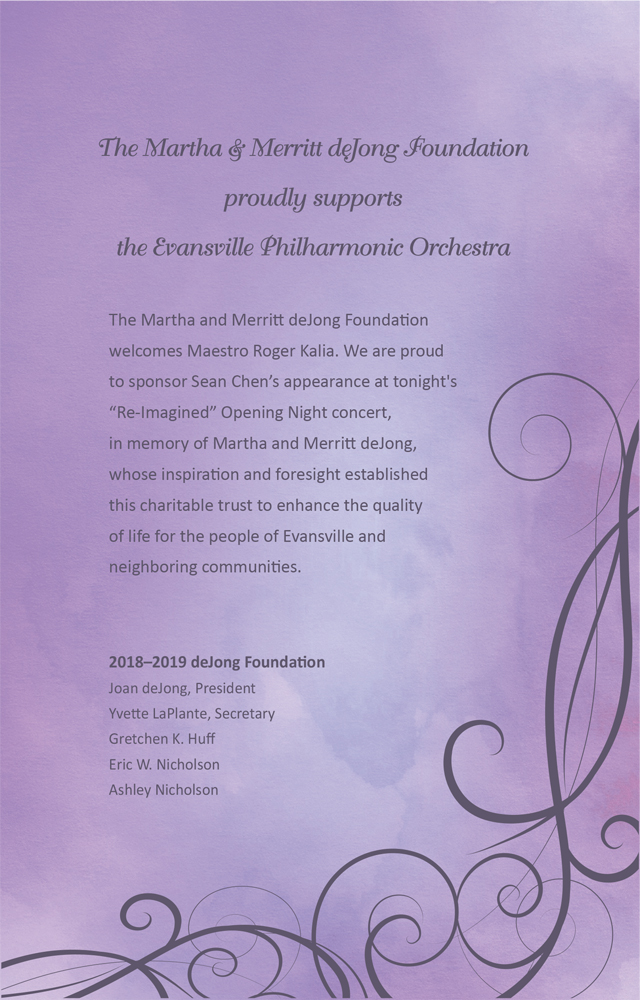
Welcome,
Maestro
Roger
Kalia!
Many thanks to the Music Director Search Committee for helping us selecting Roger Kalia as the next Music Director of the Evansville Philharmonic Orchestra!
Kimberly Bredemeier, ex officio
Emily Britton
Louis B. Cady, MD
Ross Erickson
Rita Eykamp
Jennifer Farny
Dr. Thomas Josenhans, Chair
Greg Olson
Mark K. Powers
Joyse Rivers
Diane Schroeder
Kirsten Wagmeister
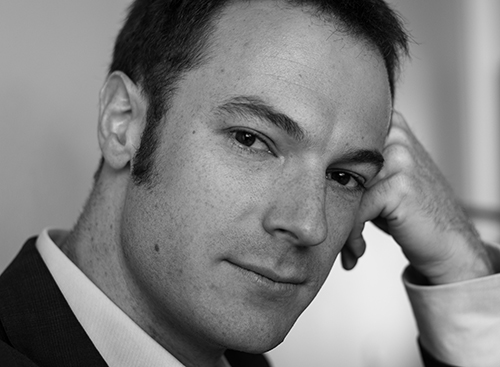 RIVER CITY (2020)
RIVER CITY (2020)
PAUL DOOLEY
Paul Dooley is one of the most prolific and performed composers in America today. His path has embraced not only his Western Classical heritage, but also a cross-cultural range of contemporary music, dance, art, technology and the interactions between the human and natural worlds. Dooley is a recipient of both the Sousa/ABA/Ostwald Award and the William D. Revelli Prize.
Dooley is a frequent guest of professional orchestras, university and high school wind ensembles and festivals in the United States and around the world. His music has been performed by, among others, the Nashville Symphony, Detroit Symphony, Singapore Symphony, “The President’s Own” United States Marine Band, the United States Navy Band, and the United States Army Band “Pershing’s Own.” Dooley’s "The Conductor’s Spellbook,” an educational, interactive and entertaining work for young audiences, has received more than 70 performances since its 2016 premiere by the Naples Philharmonic.
Born in Santa Rosa, California in 1983, Dooley began his musical life listening to Beethoven, Bruce Hornsby, Nirvana and Rush. At the age of 13, Dooley began a long mentorship with singer, songwriter, improvisor and gifted counselor Gary “Doc” Collins. In high school Dooley also studied composition with Charles Sepos, before earning bachelor degrees in mathematics and music composition at the University of Southern California (2002-2007) with Frank Ticheli and Stephen Hartke, and a master and doctorate degree at the University of Michigan (2007-2013) with Michael Daugherty, Bright Sheng and Evan Chambers.
In 2013 Dooley joined the music faculty at the University of Michigan. He created and directs the Performing Arts Technology department’s annual Computer Music Showcase. He also co-directed the Midwest Composers Symposium and was coordinator of the “ONCE. MORE.” festival, a celebration of the 50 year anniversary of the ONCE Festival of Contemporary Music.
Dooley’s band music is the subject of several doctoral dissertations including: “Paul Dooley’s Masks and Machines: A Formal Analysis and Instructional Guide” by Kevin M. Callihan, University of Kentucky; “MANIFESTOS for Wind Ensemble by Paul Dooley: A Critical Analysis” by Eddie W. Airheart, Texas Christian University; “A Conductor’s Guide and Analysis of Selected Works by Paul Dooley” by Jason Gardner, University of Illinois.
Dooley’s music is published by Paul Dooley Music.
For more information on his music, visit www.pauldooley.net and www.conductorsspellbook.com
River City program note
written by Paul Dooley
River City is dedicated to the city of Evansville, Indiana and celebrates the opening of the Evansville Philharmonic Orchestra’s 2020-21 season, conducted by my dear friend, and new music director, Roger Kalia. In June, after meeting all the orchestra members virtually, I composed several playful and heartwarming melodies which I hope capture the orchestra’s kindness and generosity, as well as Maestro Kalia’s spirited conducting. The music specifically features members of the Evansville Philharmonic Orchestra’s Eykamp String Quartet who soar above and provide an exciting sonic counterpoint to the full orchestra. The work concludes with a playful and chromatic trio melody transformed into a grandiose waltz led by the horn, trumpet and trombone.
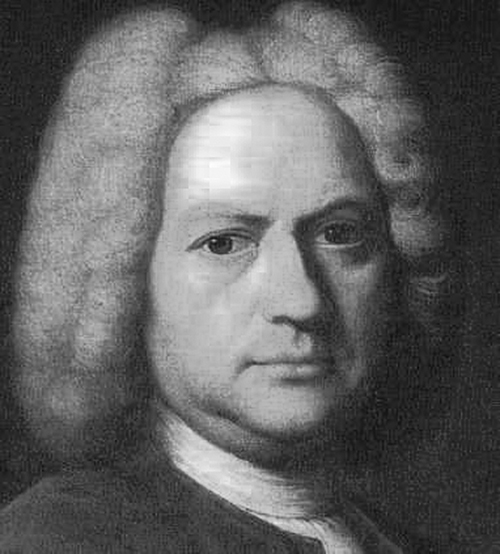 KEYBOARD CONCERTO IN A MAJOR, BWV 1055
KEYBOARD CONCERTO IN A MAJOR, BWV 1055
JOHANN SEBASTIAN BACH
Baroque era composer Johann Sebastian Bach, 1685-1750, spent his life in northern Germany, paterfamilias of a large family of fine musicians. J. S. Bach was an accomplished performer—on harpsichord and organ—but he was also a prodigious composer, and his compositions include the huge and hugely complicated Mass in B minor, hundreds of pieces for harpsichord (today also played on the piano, including tonight’s featured work), as well as hundreds of choral and instrumental works both sacred and secular. With his enormous creative output and mastery of various musical styles, he is surely one of the greatest of western composers.
Tonight’s keyboard concerto, BWV 1055 (Bach-Werke-Verzeichnis, or “catalog of Bach’s works”), is one of seven he wrote for harpsichord in 1738 or 1739. Much of the material of this concerto may derive from Bach’s earlier work; there is no original copy extant. From the very opening of the first, joyous movement, the soloist is actively engaged without break until the final notes are played; the strings play a decidedly supporting role. The second movement, a siciliano in a gently rocking 12/8 rhythm, allows the performer to weave a long melodic line in a charming dialogue with the strings. Bach concludes the work with an electrifying allegro movement.
It is often said that Bach would have written for the piano if a piano had been available to him. In fact, the piano did not reach its recognizable modern form and sound until early in the 19th century. Yet much of Bach’s work is played today on the piano (serious piano students will recall their adventures with the two volumes of the Well-Tempered Clavier). While not attempting to imitate the harpsichord with its dry, plucked sound, the pianist of this concerto must also not overpower the strings in performance. It is surely a tribute to Bach that his works adapt readily to performance on an unintended medium, in this case the piano.
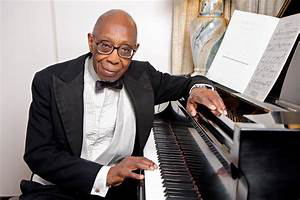 LYRIC FOR STRINGS
LYRIC FOR STRINGS
GEORGE WALKER
Pulitzer Prize-winning composer, educator, and pianist George Theophilus Walker (1922-2018) rearranged the second movement of his 1946 String Quartet No. 1 and renamed it Lyric for Strings, which has become his most well-known composition. An African-American with an impressive musical pedigree, Walker graduated from Oberlin College at the age of 18, then went on to study at the Curtis Institute of Music (where he studied piano with Rudolf Serkin) from which he graduated in 1945 with Artist Diplomas in piano and composition. Later he studied in Paris with the legendary Nadia Boulanger. His lengthy list of accomplishments includes solo appearances at New York’s Town Hall and with the Philadelphia Orchestra not to mention a number of major European orchestras as well as numerous compositions in many genres. After completing his Ph.D. degree at Eastman School of Music in 1955, he settled into a productive career as academic, composer, and performer. Walker chaired the Department of Music at Rutgers University until 1992, the conclusion of his academic career. His Pulitzer Prize award came in 1996, a fitting laureate to a long and distinguished career.
Like Samuel Barber’s Adagio for Strings (also an adaptation from a string quartet), Walker’s Lyric for Strings is slow, pensive, and poignant. Dedicated to the composer’s grandmother, who was enslaved, the work unfolds deliberately and mournfully after a brief introduction. Walker’s musical palette is decidedly late Romantic (despite the mid-century date of the music) though the contrapuntal lines sometimes cross in stirring dissonances. To me, the mood of Lyric for Strings seems more like the elegiac first movement of Shostakovich’s String Quartet #1 (a haunting response to the bombing of Dresden in WW II) yet creates an aural world all its own. Most recently Lyric for Strings was performed at a public vigil in Philadelphia that honored the life of Elijah McClain, the 23-year-old massage therapist and violinist who was killed by police in Colorado. In the words of Philadelphia Orchestra double-bassist Joseph Conyers, who performed at that event: “There’s an arch in the piece that begins with an optimism embodied in love and compassion. That love morphs into an acknowledgement of the struggle that such positive forces can face in the world—a world where optimism can seem in short supply.” I think that Walker’s musical and lyrical conclusion is that a noble though tempered optimism can prevail.
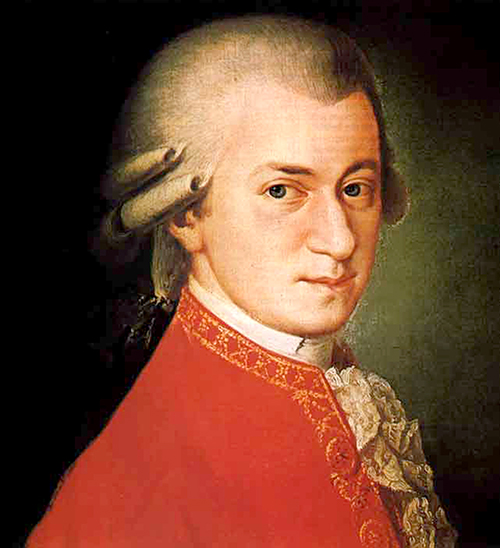 DIVERTIMENTO FOR STRINGS, K. 136
DIVERTIMENTO FOR STRINGS, K. 136
WOLFGANG AMADEUS MOZART
Wolfgang Amadeus Mozart, 1756-1791, was an Austrian composer who wrote in all musical genres and, astonishingly, mastered every one. He is certainly one of the most well-known of western composers, and his genial grasp of musical form and musical expression has made him one of the most beloved of all composers.
Tonight’s work, the Divertimento K. 136, was written when the composer was 16 years old. Already at his young age, the composer had lived in London and Paris and had travelled and performed throughout Europe.
The genre divertimento (from Italian divertire, “to amuse”) indicates a work, usually lighthearted, that is designed to amuse its audience. Typically secular, a divertimento might often have introduced a more serious, sombre work at a concert. Tonight’s work is more like a mini-symphony: it is comprised of three movements, fast-slow-fast, beginning and ending in a single key (D major), with some thematic development and plenty of virtuosity required of the string players throughout.
The K. in the classification of the Divertimento K. 136 refers to the work of musicologist Ludwig Ritter von Köchel, an independent musicologist in the 19th century, who classified all of Mozart’s works. Independently wealthy, Köchel was, among other things, a botanist whose plant forays took him to Russia and North Africa in his botanical research. His name—or, rather, his initial—has remained linked to the varied and amazing oeuvre of Mozart.
- Podcast
- Conductor Biographies
- Bill Hemminger Biography
- Photos
- Videos
- Articles and Reviews
- Radio Broadcast Schedule
- History of the EPO
- Mission and Values
- Board of Directors 2025-2026
- Sponsors 2025-2026
- Philharmonic Gives Back
- Donors 12/1/2024 - 12/1/2025
- Thoughtful Tributes 12/1/2024 - 12/1/2025
- Past Events


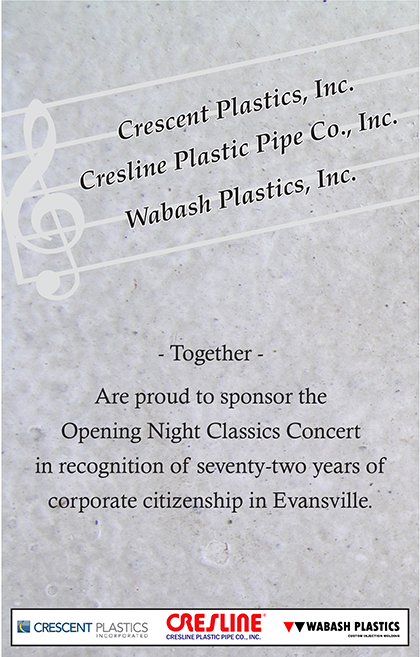
 20.jbi.png)
 20.mod.png)
 20.jbi.png)
 20.jbi.png)
 20.mod.png)
 20.jbi.png)
